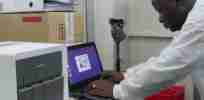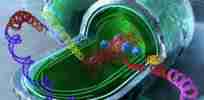OneZero
Articles written for the GLP list the source as Genes and Science. All other articles were written for the sources noted with excerpts provided by the GLP.
4,000 US babies are born with mitochondrial diseases. That could be fixed by a new form of gene editing
With the first experiments to use CRISPR in people underway, the gene-editing technique is showing promising signs in a few ...
Human organ factories? Defense Department seeds Segway inventor Dean Kamen’s ambitious project, but success seems years away
[N]one of [Dean Kamen’s] many inventions — including the Segway — has an impact that comes close to what could ...
After CRISPR human embryo experiment goes awry, some call for gene editing restrictions
Biologist Kathy Niakan and her team at the Francis Crick Institute wanted to better understand the role of a particular ...
Gene editing cures hereditary deafness in mice. Are humans next?
Two to three out of every 1,000 children born in the United States have a diminished level of hearing or ...
Gene therapy could restore color vision for people who see the world in shades of gray
In a small trial in Germany, an experimental gene therapy improved the vision of nine people with total color blindness, ...
Could CRISPR turn nutritious but unpopular vegetables into flavorful snacks?
You probably know that kale is packed with antioxidants and other nutrients and that you should be eating more of ...
A CRISPR fix for diabetes? Success using stem cells in mice offers promise for humans
[Researchers] recently used the gene-editing technology CRISPR to correct stem cells from diabetic patients and turn them into fully functioning ...
Can CRISPR gene editing give us an allergy-free cat?
If you’re among the 10% of people who are allergic to cats, you can blame a protein found in cat ...
Seeking mainstream acceptance for psychedelic drugs: Will entrepreneurs ruin it for everyone else?
After spending decades as highly illegal and restricted substances, psilocybin (magic mushrooms), LSD, MDMA, DMT, and other psychedelic drugs are ...
Our wastewater could provide ‘early warning’ system for coronavirus outbreaks
We won’t have to shelter from the new coronavirus forever. ... But several predictors of Covid-19 outbreaks suggest the virus ...
Whole genome sequencing could be the next big thing for consumers
Genome sequencing was once impossibly expensive. The Human Genome Project, an international effort to decode the human genome that launched ...
Finding where ‘consciousness resides in the human brain’ could help us awaken comatose patients
Some people may gradually come out of a coma or wake up after a few weeks.... To help these people, ...
‘Politics and war’: Why life on other planets would look a lot like our own
If other beings do populate the universe, what are they doing out there? Are the possible inhabitants of Teegarden b, ...
Lack of minority donors in bone marrow registries ‘one part of a larger, systemic, problem’
People of two or more races are uniquely disadvantaged when it comes to bone marrow matching. Blood diseases such as ...
Collecting DNA samples from migrant detainees opens door to enhanced government surveillance
[T]he United States government will begin collecting DNA samples from thousands of people detained by immigration officials, including minors, and ...
Finding a new home: Humanity’s survival could depend on a 1,000-year space journey to Proxima b
Located in the triple-star Alpha Centauri solar system, Proxima b has a mass 1.3 times that of Earth and a ...
$1 million for anti-aging gene therapy? ‘Dubious’ treatment raises ethical concerns
Would you pay $1 million and fly to South America for a chance to live longer? Libella Gene Therapeutics, a ...
Dark side of brain upgrades: They could give corrupt leaders ‘the ultimate way to ensure good citizenship’
It’s 2045. You stroll into the Center for Mind Design. There you can purchase a brain chip to augment your ...
It’s been a year since the CRISPR baby controversy. Why are we still without global gene-editing rules?
Around this time last November, Chinese scientist He Jiankui stunned the world when he revealed the birth of the first ...
Xeno-Skin: Genetically engineered pigs may be source of transplantable skin for humans
In a pathogen-free facility in Grafton, Massachusetts, a small town about 40 miles west of Boston, genetically engineered miniature pigs ...

Identifying potential Ebola ‘hot spots’ with new tools could prevent future outbreaks
More than 2,000 people have died in the Democratic Republic of Congo since an Ebola outbreak was declared last August, ...
Create a fetus without an egg or sperm? Researchers have done it with mice
Reproduction used to be a simple thing: two parents, one egg, one sperm, one embryo, one baby. But on [October ...
Orange skin? That’s just one of the ways our bodies might evolve if we settle on Mars
Over time, we should expect a fair bit of evolutionary divergence between Mars settlers and the human population on Earth, ...
Controversial ‘3-parent baby’ technique not effective for women over 36, fertility doctors warn
An experimental and much-hyped reproductive procedure that mixes DNA from three people is not effective at boosting the chances of ...
Turning DNA into a hard drive for data storage. How do you extract the data when you need it?
With massive amounts of data being generated around the world every day, DNA is poised to provide an ultracompact storage ...
Here’s a neural implant that doesn’t require open brain surgery
Facebook and Neuralink’s plans to merge people with their devices will likely take several years to materialize. Wearables like what ...

‘Synthetic biology doesn’t have to be scary’: It could offer us new medicines, biofuels and everything in between
Though hacking organisms and rearranging genomes may sound scary, there is definitely a Light Side to this narrative (a balance, ...
Infographic: Our skulls have been shrinking for 250 years—’our faces have begun to deform’
Science suggests that crooked teeth, overbites, narrow jaws, and crimped nasal airways are a modern phenomenon. Skeletal remains show that just 300 years ago, humans ...

